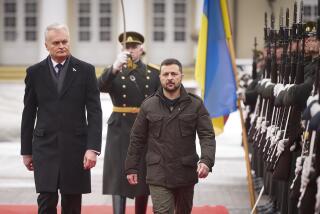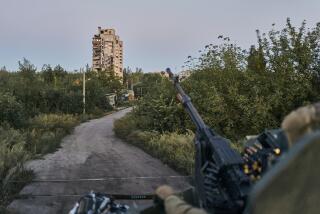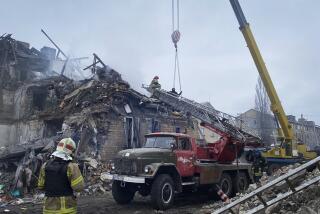European official decries separatist violence in eastern Ukraine
As pro-Russia separatists clubbed their way into another regional government headquarters in eastern Ukraine on Tuesday, a top official of the Organization for Security and Cooperation in Europe appealed for restoration of the “rule of law” and the release of journalists and military observers detained by the militants.
Seven military observers on a mission of the OSCE, a 58-member security alliance to which Russia and Ukraine both belong, are among the hostages seized by separatist gunmen in the eastern Ukrainian city of Slovyansk last week. The militants seeking independence from the government in Kiev, the Ukrainian capital, are also holding at least two Ukrainian journalists, and two British television journalists were attacked by separatist protesters at a rally in Donetsk on Monday, said Dunja Mijatovic, OSCE media freedom chief.
“Impunity for assailants of journalists and broadcasters is escalating the tensions and contributing to the deterioration of the security situation,” Mijatovic said in a statement from alliance headquarters in Vienna. “I am dismayed by the lack of response by the law enforcement authorities to these attacks. Rule of law must be reintroduced in Ukraine.”
Mijatovic also denounced militant takeovers of regional broadcasting stations where Ukrainian programming has been cut off and replaced with Kremlin-controlled Russian newscasts.
Police and Interior Ministry forces have been ousted from their stations in about a dozen towns and cities in the turbulent eastern regions in the separatist actions that Kiev authorities contend are being instigated and directed from Moscow.
On Tuesday, about 150 militants armed with clubs and baseball bats beat their way into the Luhansk regional administration building and drove out local police who had been protecting it.
“The building is ours. That’s it,” Luhansk protest leader Oleg Dereko told RIA Novosti.
Russia Today television reported that protesters applauded the ousted Ukrainian police guards “for not confronting the activists with violence.”
Russian media describe the militants occupying key government facilities in eastern Ukraine as “self-defense forces” or “pro-federalization” demonstrators seeking local referendums on independence from the Kiev government, and in some cases annexation to Russia.
In Kiev, Deputy Foreign Minister Danylo Lubkivsky repeated the government’s accusation that the unrest was being directed by the Kremlin.
“They have no real political agenda. They have no political goals, and they have no intention of holding any dialogue. They simply execute orders from Russian authorities,” Lubkivsky said of the pro-Russia militants.
In one of the most brazen acts of violence plaguing eastern Ukraine, Kharkiv Mayor Gennady Kernes was shot in the back on Monday while exercising on the outskirts of Ukraine’s second-largest city. Kernes, although a former ally of ousted Ukrainian President Viktor Yanukovich, had refused to support the separatists trying to wrest the Kharkiv region from Ukraine. Kernes was reported by Israeli media to have been transferred to a hospital in Haifa, Israel, where he underwent surgery and was said to be in serious but stable condition Tuesday.
In Kiev, Ukrainian lawmakers met Tuesday and discussed the possibility of holding a nationwide referendum on whether Ukraine’s governing structure should be revised to devolve more powers to the regions, but no consensus was reported.
Former Prime Minister Yulia Tymoshenko, whose party has dominated the interim government and parliament since the Feb. 21 ouster of Yanukovich, warned fellow lawmakers against ceding too much authority to the regions and putting unity at risk.
“While we are giving authority to local administrative bodies, we are obliged -- under any circumstances -- not to lose authority over the country,” Tymoshenko was quoted as telling the parliamentary session.
Interim Prime Minister Arseny Yatsenyuk has discussed with eastern regional leaders proposed constitutional reforms to decentralize the government. But the lengthy and collaborative process for making such changes would clearly not be undertaken before the country’s May 25 presidential election. Ukraine’s interim leaders have accused Russian President Vladimir Putin and his government of seeking to disrupt the vote so that they can continue to claim Ukraine lacks an elected and legitimate leader.
OSCE Secretary-General Lamberto Zannier was in Kiev on Tuesday to meet with Ukrainian officials and diplomats from the alliance, which has multiple missions underway in the country. Zannier consulted with the Kiev-based coordinator of the Special Monitoring Mission deployed after Russia’s military incursion into and annexation of Ukraine’s Crimea region, as well as with the head of the OSCE election observer delegation preparing for the presidential vote in less than five weeks.
A statement on Zannier’s one-day visit was issued in Vienna but made no mention of progress in gaining release of or access to the detained military observers seized in Slovyansk on Friday.
Eight European military observers and five Ukrainian officers were stopped and detained entering Slovyansk by masked and armed men. One of the Europeans was released over the weekend because of a medical condition, but the rest remain in the gunmen’s custody.
The monitors were deployed by OSCE to evaluate Kiev’s report of unusual military activity in the region, as prescribed by the Vienna Document, to which both Russia and Ukraine are signatories and which is a cornerstone of European security doctrine in the post-Cold War era.
More to Read
Start your day right
Sign up for Essential California for news, features and recommendations from the L.A. Times and beyond in your inbox six days a week.
You may occasionally receive promotional content from the Los Angeles Times.







